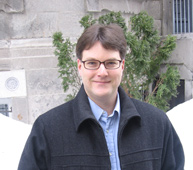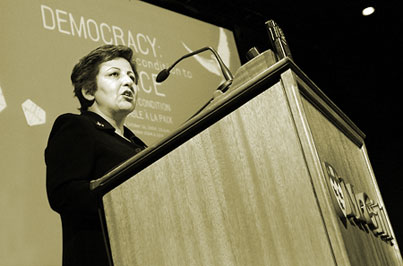AROUND CAMPUS
Mini-Beatty tackles major questions

Istockphoto
How did life arise on Earth? What kind of environments can life tolerate? How can we determine if life exists on other planets? These are just a few questions that astrobiologists – researchers who straddle the diverse worlds of astronomy, physics, biology and geology – tackle in their ongoing search for life in the universe. On March 12, Dr. Carl Pilcher, Director of the NASA Astrobiology Institute (NAI) at the NASA Ames Research Center, will address the scientific foundations of astrobiology and will explain how the NAI addresses the challenges of bringing diverse disciplines together.
His Mini-Beatty lecture, "Studying Life in the Universe: The Challenges of Cross-Disciplinary Research," will also focus on some recent findings from work done in collaboration with McGill scientists in the Canadian High Arctic.
Mini-Beatty lecture; March 12; 6:00 p.m. – 7:00 p.m.; Room M1, Strathcona Anatomy & Dentistry Building; 3640 University. Free; open to the public. This lecture is part of the Astrobiology Lecture Series 2008. For more information, please visit: www.medicine.mcgill.ca/mnmsmi/als_2008.htm.
Power to the people

Courtesy of Patrick Fournier
If the U.S. primary process or, closer to home, the realities of a minority government have been any indication, politics often makes for peculiar behaviour. And that makes for interesting research, especially if you ask a professor of political science such as Patrick Fournier. As an Associate Professor in the Department of Political Science at l'Université de Montréal, Fournier's focus on political behaviour has led him to examine emerging critical issues such as political psychology, voter attitudes, citizen assemblies, and public opinion trends.
Fournier has been spending the semester here at McGill, as only the second Eakin Visiting Fellow in Canadian Studies. Established last year, the fellowship allows the McGill Institute for the Study of Canada to host scholars focusing on studies related to Canada.
On March 17, Fournier will share some of his insights with the McGill community. "When We Give Power to the People: Lessons from Citizen Assemblies" will explore a trio of cases representing unprecedented democratic experiments, where the government decided to let a random group of ordinary citizens design public policy.
March 17, 2008; 5:00 p.m.; Faculty Club; 3450 McTavish St. Free; open to the public. For more information, contact Luke Moreau at (514) 398-2010.
Brave new world?

Istockphoto
Many pro-democracy advocates see technology as a tantalizing tool with the power to liberate the oppressed masses. But does more technology really mean more freedom? While more people have access to things like computers, cellphones and the Internet, the promise of increased civic engagement enabled by these gadgets seems to have eluded our wired society.
Darin Barney, McGill Canada Research Chair in Technology and Citizenship, believes that "technology is, at once, irretrievably political and consistently depoliticizing. It is at the centre of this contradiction that the prospects for citizenship in the midst of technology lie." On March 14, Barney will give a public lecture titled "One Nation Under Google: Citizenship in the Technological Republic" in which he examines the challenge of citizenship in a technological society, and asks whether the demands of technology are taking over the practice of democracy.
One Nation Under Google: Citizenship in the Technological Republic; March 14; 6:30 p.m.; Arts W-215, 853 Sherbrooke Street West. Free and open to the public.
Free and fair

Istockphoto
While the violent and chaotic images that emerged from Kenya following recent elections still linger, the Centre for Developing-Area Studies (CDAS) is hosting a most timely event. The March 13-14 conference, "Encouraging a Fair Vote: The Role of the International Community in Helping to Strengthen Election Commissions," will bring together leading international authorities in electoral promotion to identify the steps required to strengthen the integrity of national electoral processes. Edward Joseph, a Visiting Fellow at the School of Advanced International Studies at Johns Hopkins University who served for over a decade in the Balkans with the U.S. Army/NATO, the UN and the International Crisis Group, will present a keynote address on the need for early monitoring of election commissions. His lecture will be followed the next day with a series of public discussions relating to the role of the international community in working with electoral commissions.
2008 CDAS Conference; Encouraging a Fair Vote: The Role of the International Community in Helping to Strengthen Election Commissions; March 13-14; Ritz-Carleton Hotel; 1228 Sherbrooke St. West. Edward Joseph keynote address is at 6 p.m. on March 13. March 14 public discussions begin at 9 a.m. All events are open to the public, but please RSVP.
Islam and human rights

Owen Egan
The issue of human rights in Iran usually raises more questions then answers. Sometimes, the best way to better understand a complicated situation is to listen to the voices of those who live and work in it on a daily basis. On March 7, the McGill Faculty of Law's Centre for Human Rights and Legal Pluralism will welcome one of Iran's most prominent defenders of human rights, 2003 Nobel Peace Prize laureate Shirin Ebadi, for a public lecture.
Shirin Ebadi is an Iranian lawyer, which in and of itself represents a hard-fought victory. In 1975, she had been named a judge, which was a first for a woman in the history of Iranian justice. However, following the Islamic Revolution in 1979, she and other female judges were dismissed from their posts and given clerical duties. She retired from this post and attempted repeatedly to obtain a lawyer's licence. She was denied often by the regime, which finally relented in 1992.
Ebadi is known for promoting peaceful, democratic solutions to societal problems, and is well-known for her legal defence of victims of attacks on freedom of speech and political freedom. In 2003, she joined the legal team representing the family of Zahra Kazemi, the Iranian-Canadian photojournalist who died while being held in an Iranian prison.
Shirin Ebadi; March 7; 2:00 – 3:30 p.m.; Moot Court, Faculty of Law, 3660 Peel Street. Free; open to the public.
Search
Search (skip):
GALLERY

Teenager Abdul Bari listens as village elders in Shah Wali Kot, Afghanistan, meet with Canadian soldiers who seek intelligence on Taliban activities. The photo was taken in August 2007 by Alex Dobrota, who is presenting this and other striking images during Reconstructing Trust?, an exhibit being held at the Faculty of Law’s Atrium, 3660 Peel Street, until March 7 at 6:00 p.m.
Alex Dobrota, The Globe and Mail

Iceberg was taken by Lauren Goodman, a master’s student in Dietetics and Human Nutrition, in Grise Fiord, Nunavut. The photo will be part of the Artists Among Us: Graduate Student & Faculty Art Exhibit and Sale at the Redpath Museum on March 14, from 2:00-5:00 p.m. The exhibit is part of Graduate Career Week (March 10-14). For more information go to CAPS.
Lauren Goodman

